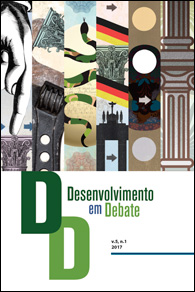Political Conservatism in Russia
Palavras-chave:
Conservatism, Right Populism, Eurasianism, Sovereign DemocracyResumo
In this paper I discuss the conservative turn that took place in Russia in the last 15 years comparing it to the recent experience of Hungary and Poland. I show that to a large extent this backlash is of a socioeconomic nature and reflects the people’s frustration with the downsides of the economic liberalization. Moreover, the depth of the original social transformation determined a society’s ability to resist to the conservative trend. In Russia where the modernization processes were the shallowest, the old political elites could regain power sooner and roll back the society deeper. I also overview different conservative schools of thought in Russia and show Putin manipulated this ideology to strengthen his hold on power.
Downloads
Referências
ASLUND, A. (2008) Putin’s Lurch toward Tsarism and Neoimperialism: Why the United States Should Care. Demokratizatsiya, The Journal of Post-Soviet Democratization
(1):17-25•December, https://www2.gwu.edu/~ieresgwu/assets/docs/demokratizatsiya%20 archive/ GWASHU_DEMO_16_1/2T54R87451R1217G/2T54R87451R1217G.pdf
BARTLETT, D. (1997). The Political Economy of Dual Transformation. Market Reform and Democratization in Hungary. The University of Michigan
BERGLUND, S. (ed) (2013) The Handbook of Political Change in Eastern Europe. Edward Elgar Publishing Inc., - P.196
BLOOR, d. (1997) ‘The Conservative Constructivist’ History of the Human Sciences, 123–5.
DENISOVA, I.; M. ELLER; T. FRYE; & E. A ZHURAVSKAYA (2007) “Who Wants to Revise Privatization and Why? Evidence From 28 Post-Communist Countries”.
CEFIR and NES Working Papers. n 105
GOSTYŃSKA-JAKUBOWSKA, A. (2016) Poland: Europe’s new enfant terrible? Bulletin Article by Center for European Reform, 22 January 2016// https://www.cer.org.uk/sites/default/ files/bulletin_106_ag_article1.pdf
HELLMAN, J. S. (1998) Winners Take All: The Politics of Partial Reform. World Politics, Volume 50,
Issue 2
HILL, F & GADDY, C. (2013) Mr Putin : Operative in the Kremlin. The Brookings Institution
HOWORITZ, s. (2000) National Identity and Liberalizing Consensus in Poland, Hungary and The Czech Republic. The Polish Review, Vol. 45, No. 2, pp. 197-216
HUNTINGTON, S. P. (1957) Conservatism as an Ideology. The American Political Science Review, Vol. 51, No. 2 (Jun), pp. 454-473// https://www.jstor.org/stable/pdf/1952202.pdf
IVANOV, S. (2006) “Triada natsionalnykh tsennostei” [The triad of national values], Izvestiya, July 13, 2006. Available at http://www.izvestia.ru/politic/article3094592/(accessed January 10, 2008).
KAROLEWSKI, I. & BENEDIKTER, R. (2016) Is Poland Really Lost? Poland’s Contested Governance Reforms and the further Role of the Central Eastern European area (CEE) in the EU, Working Paper for The Europe Center, Freeman Spogli Institute for International Studies, Stanford University, https://fsi.fsi.stanford.edu/sites/default/files/poland-cee-and-eu- karolewski-benedikter-2016-final3.pdf
LARUELLE, M. (2015) Eurasia, Eurasianism, Eurasian Union TERMINOLOGICAL GAPS AND OVERLAPS PONARS Eurasia Policy Memo No. 366, July, http://www.ponarseurasia.org/sites/ default/files/policy-memos-pdf/Pepm366_Laruelle_July2015.pdf
LOCH, D. & NOROCEL, C. (2016). The Populist Radical Right in Europe A Xenophobic Voice in the Global Economic Crisis, Europe’s Prolonged Crisis: The Making or the Unmaking of a Political Union (Palgrave Studies in European Political Sociology, Palgrave Macmillan; 1st ed. 2015 edition (April 29, 2016)
MAINWARING, S.; A. M. BEJARANO; & E. LEONGÓMEZ eds (2006) The Crisis of Democratic Representation In The Andes, Stanford, California, Stanford University Press
MANNHEIM, K. (1953) “Conservative Thought,” Essays on Sociology and Social Psychology, ed. Paul Kecskemeti (New York, 1953), pp. 98-99.
MÜLLER, J, A. (2016) The Problem with Poland. The New York Review of Books, http:// www.nybooks.com/daily/2016/02/11/kaczynski-eu-problem-with-poland/
MULLER, J. (Ed) (1997) Conservatism: An Anthology of Social and Political Thought from David Hume to the Present. Princeton University Press, Princeton, New Jersey, – p.5
OFFE, C. (1991). Capitalism by Democratic Design? Democratic Theory Facing the Triple Transition in East Central Europe. Social Research, 58(4), p.865-881. January, pp. 203-234
PERSON, R. & LANDRY, P. (2016) The Political Consequences of Economic Shocks,
Problems of Post-Communism, 63:4, 221-240
ORBÁN, in uk speech, calls for return to traditional european value. Politics.hu, October 10th, 2013. //http://www.politics.hu/20131010/orban-calls-for-traditional-values-to-meet-modern- challenges/
PROZOROV, S. (2004) Russian Conservatism in The Putin Presidency: The Dispersion of a Hegemonic Discourse. Working Paper 2004/20. Danish Institute for International Studies// C:/ Users/809450/Downloads/RUSSIAN_CONSERVATISM_IN_THE_PUTIN_PRESID%20(1).pdf
PUTIN, V. (1999), “Rossiya na Rubezhe Tysyacheletiy.” Nezavisimaya Gazeta, Dec. 30.
ROSEFIELDE, S. & DALLAGO, B. (2016). Transformation and Crisis in Central and Eastern Europe: Challenges and Prospects. New York, NY Routledge
SNEGOVAYA, M. (2014) How Putin’s worldview may be shaping his response in Crimea. Monkey Cage, Washington Post, march 2, 2014, https://www.washingtonpost.com/news/ monkey-cage/wp/2014/03/02/how-putins-worldview-may-be-shaping-his-response-in-crimea/
ZOLTAN, S. (2014) Orban Says He Seeks to End Liberal Democracy in Hungary. Bloomberg, 28.07.2014 http://www.bloomberg.com/news/articles/2014-07-28/orban-says-he-seeks-to-end- liberal-democracy-in-hungary
ZEVELEV, I. (2014) The Russian World Boudaries.Russia’s National Identity Transformation and New Foreign Policy Doctrine. Russia in Global Affairs, Moscow, April.
Downloads
Publicado
Edição
Seção
Licença

Este trabalho está licenciado sob uma licença Creative Commons Attribution 4.0 International License.

